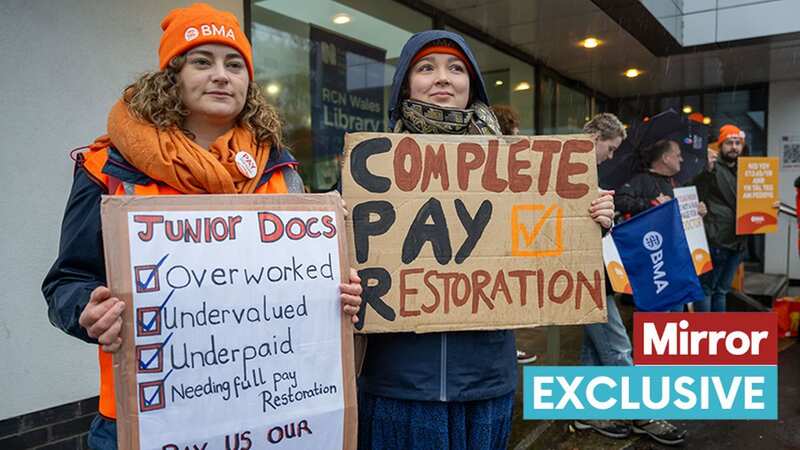Junior doctors get public backing ahead of five-day strike as ministers blamed

The public has given its backing to junior doctor strikes ahead of five days of walkouts starting this weekend.
Ministers are under growing pressure to resolve the dispute as they are increasingly blamed by voters for the industrial action.
Polling by Savanta, shared exclusively with the Mirror, shows the majority of people (53%) back the junior doctors in their fight over pay. That is almost double the 28% who said they are opposed.
Support for the medics has remained steady even as the action has dragged on, with the latest figures almost the same as last April when 56% said they backed them. Almost half (46%) said the Government is most to blame for the industrial action, an increase of five points since last April. Only 13% say the strikes are the responsibility of junior doctors themselves.
The strike action by junior doctors in England will take place from 7am on Saturday and run until the end of Wednesday. Many routine hospital services are likely to be disrupted or cancelled.
 Teachers, civil servants and train drivers walk out in biggest strike in decade
Teachers, civil servants and train drivers walk out in biggest strike in decade
This will be the 10th walkout by junior doctors since March last year. It follows a six-day strike in January, which was the longest in the history of the NHS and saw about 100,000 appointments cancelled.
Nearly half of NHS doctors are junior doctors, who range from those just out of university to some who have 10 years or more experience. The BMA is demanding their pay be restored after 16 years of below-inflation rises.
Professor Phil Banfield, BMA council chair, said: “This survey shows that junior doctors continue to be supported by the public – their patients in many cases – who quite clearly see how unjust it is for junior doctors to have had their pay fall in real-terms year on year, while their workload spirals upwards.
"Crucially almost half of those asked – the largest proportion by a long way – blame the UK Government for this dispute going on for this long, and they would be right. It’s time for ministers to put patients before politics and put an end to the strikes by paying junior doctors what they are worth for the skills and expertise they have trained for so long to acquire, and which this country so desperately needs to keep.”
Health chiefs have warned the NHS in England is facing an "enormous challenge" in the days ahead from the combined impact of winter pressures and the strike action.
An average of 2,208 patients were in hospital in England each day last week with flu, including 112 in critical care beds, NHS data shows. The total is down slightly by 8% from 2,390 the previous week, but is still up 68% since the start of January, while the number in critical care is the highest so far this winter.
Delays in discharging patients continue to put further pressure on hospitals, with an average of 13,624 beds per day last week occupied by people medically fit to leave.
Savanta interviewed 2,127 adults in the UK online between February 16 and 18.
'Voters mainly blame the Government for the strikes dragging on'
By Chris Hopkins, Political Research Director at Savanta
"Despite the government's best efforts, junior doctors continue to enjoy a large amount of support from the public. Our research shows that even on the question of pay - where there has been some pushback on junior doctor's demands - people broadly back them to get a better deal.
 Greggs, Costa & Pret coffees have 'huge differences in caffeine', says report
Greggs, Costa & Pret coffees have 'huge differences in caffeine', says report
"More concerning for Rishi Sunak will be that, as far as the public is concerned, blame lies mainly with the government for industrial action dragging on. Governments usually hope that ongoing strike action wears down the public’s support for those taking action, but if anything the opposite seems to be happening here, with more of the public blaming the government than last year.
"One of the reasons for this could be that the vast majority of the public don’t feel like the previous junior doctors’ strikes have affected them. If more do feel the impact, that could well change. With junior doctors continuing to enjoy a high level of support, they will likely feel emboldened to continue to push for a better pay deal. The government however is clear that this isn't going to happen - so it may well be that there is no end in sight for strikes in the near future.
There are also challenges ahead for the Labour Party. Their core voters are particularly supportive of those taking industrial action, despite Labour making clear it is unlikely they would be more generous than the current government. If this becomes Labour's problem in power, the pressure on them to resolve the situation could be significant."
Read more similar news:
Comments:
comments powered by Disqus

































